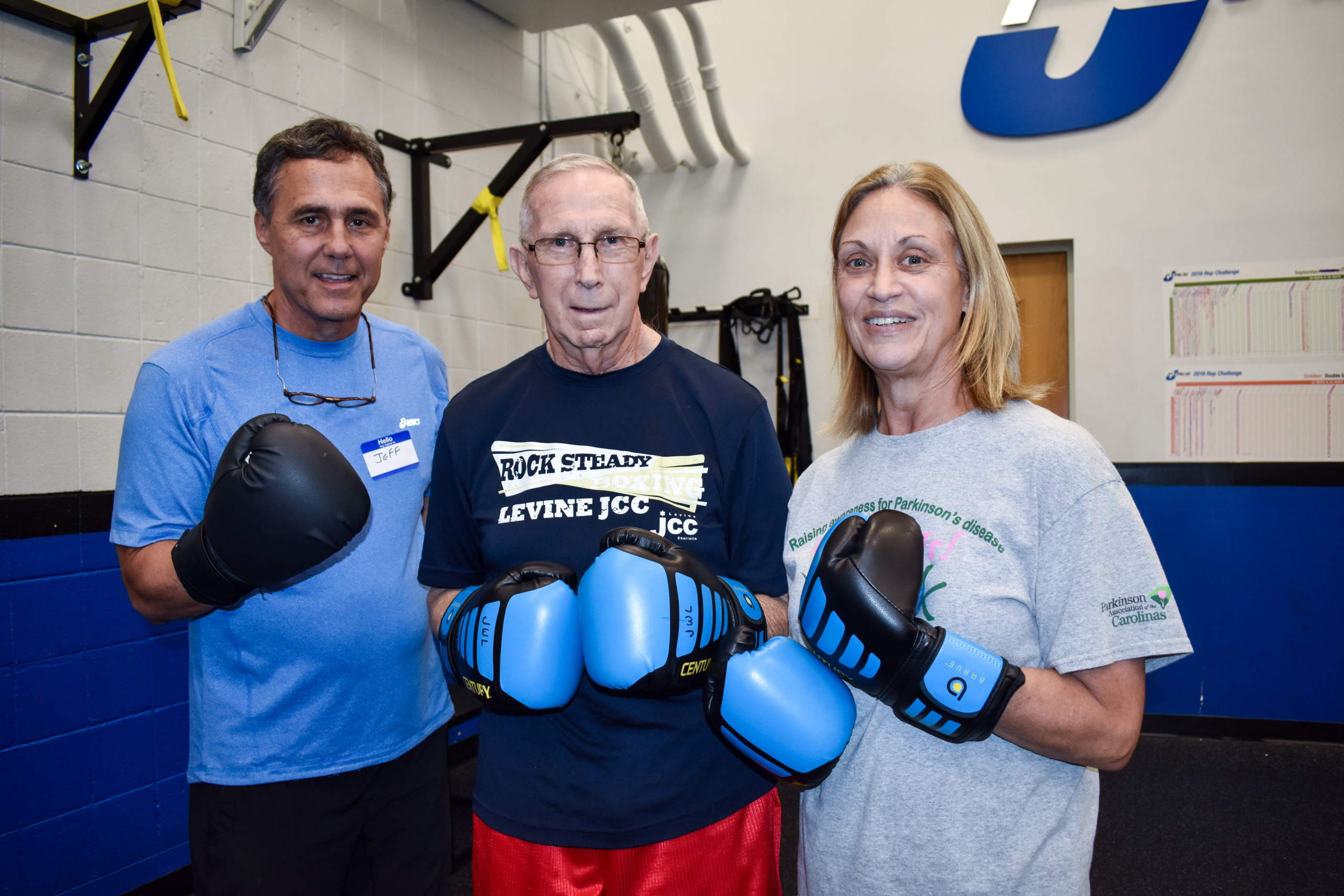By Amanda Levine, JFS Licensed Therapist and Charlotte Rouchouze
The month of April is set aside each year to spread awareness about Parkinson’s, the neurodegenerative disease that affects seven to 10 million people globally. According to the Parkinson’s Foundation, about one million people in the United States are living with Parkinson’s disease, which is more than the number of people diagnosed with multiple sclerosis, muscular dystrophy and Lou Gehrig’s disease combined. This number is expected to rise to 1.2 million people by 2030. During Parkinson’s Awareness Month, the primary goals are to reduce the stigma surrounding the disease and focus on education about the disease. There are many ways to observe Parkinson’s Awareness Month including attending a local event, volunteering, showing support on social media networks, or scheduling a visit with a neurologist. At Shalom Park the need is responded to in several ways by both the Levine Jewish Community Center (LJCC) and Jewish Family Services (JFS).
In 2017, Charlotte-area residents facing a Parkinson’s diagnosis got a new tool in their fight against the disease. That involved fighting it, literally, with boxing gloves through the LJCC Rock Steady Boxing classes. It started when Shirlee Wadsworth, a Parkinson’s patient and regular at the LJCC, approached Suzanne DiOrio (head coach) with a newspaper clipping. She read about a new boxing regimen that was shown to tremendously help others with Parkinson’s and wanted Suzanne to teach her. Suzanne had never heard of it, but she agreed to take it on. What started with a kind gesture to help a member has turned into supportive community for those struggling with Parkinson’s. At the pre-COVID peak, the program had almost 60 participants. The program is led by three coaches who are certified by the Rock Steady Boxing national program in Indianapolis, Indiana. Part exercise group, part support group, the program aims to provide a truly loving and motivating community.
In 2021, the LJCC added a Friday yoga class for individuals with Parkinson’s. Instructor Aminta St. Onge says, “Our class works on breathing techniques, yoga movement/postures, balance, meditation, and creates mind/body awareness. Specific movement and practices address symptoms and help participants manage some of their symptoms. Yoga is an excellent tool to benefit the nervous system while providing a sense of confidence and calm. The class is also for caregivers.”
Additionally, in 2021, the LJCC’s Oasis Senior Enrichment Program added monthly “coffee houses” to provide support and education to those with Parkinson’s and their families. Last year, Dr. Sanjay Iyer, a well-respected neurologist in Charlotte and doctor to many of the patients in the LJCC’s programs, spoke to the group about a new, breakthrough drug therapy for Parkinson’s. Jill Lipson, director of the LJCC’s Senior and Adult Programs says, “The Levine JCC is committed to supporting the Parkinson’s community as much as possible. Thanks in great part to a grant from Carolina Foundation for Jewish Seniors, services for families living with Parkinson’s disease have been able to expand and flourish over the past several years.”
Caregiving for a loved one with Parkinson’s can be an emotional and challenging journey. Jewish Family Services offers a variety of support group options, including a Parkinson’s Caregiver Support Group specifically for individuals caring for family members with Parkinson’s disease. JFS also offers individual counseling services and case management services for individuals that may require additional support managing their emotional health and wellbeing or may need assistance exploring available resources.
Having a strong support is essential for the wellbeing of the caregiver and the individual with Parkinson’s. Caregiver responsibilities may include helping a loved one with daily activities, making financial decisions, or managing medications and medical appointments. Unfortunately, caregiver stress is common when caring for someone with a chronic illness like Parkinson’s, especially for an extended period. According to the Parkinson’s Foundation, 40%-70% of caregivers are significantly stressed, and about half of these caregivers meet the diagnostic criteria for clinical depression. There are several common warning signs to be aware of in order to address caregiver fatigue. Some of these include ignoring or postponing taking care of physical health needs, growing feelings of isolation, feelings of anxiety and uncertainty, feelings of anger often followed by guilt, bitterness toward friends or relatives, emotional strain/distress often manifesting as varying physical symptoms, and depression, despair or feelings of hopelessness. Depression can interfere with the ability to engage in daily activities and provide the necessary care for both the caregiver or a loved one. It is critical that the caregiver continues to assess mental and emotional needs throughout the caregiving journey.
There are several ways to help manage excessive stress and combat caregiver burnout. First, it is important for caregivers to place their own physical, medical and emotional needs on par with the person with Parkinson’s. Engaging in self-care practices regularly and finding life balance is essential. Taking regular breaks from caregiving is a crucial part of this balance. These breaks are particularly important for those that provide 24-hour care. Maintaining social connections is also an integral part of the caregiver’s emotional wellbeing. It is important that caregivers have an outlet for their emotions and be honest with themselves if they are needing additional support. That support may include seeking professional help or counseling. A therapist or psychiatrist can help to identify causes of distress and provide strategies to better cope with challenging feelings and emotions.
There is no cure for Parkinson’s and there is still much unknown about the disease. Parkinson’s Awareness Month is an annual opportunity to educate, raise awareness, and support the caregivers and those individuals living with this condition. Whether you choose to attend a local event, volunteer, or make a donation to one of the many Parkinson’s organizations, there are several ways to raise awareness and take part in Parkinson’s Awareness Month. Charlotte is fortunate to have agencies like Jewish Family Services and the Levine Jewish Community Center that are dedicated to education and support not just in April, but all year long.
If you or someone you know has been diagnosed with Parkinson’s or is the caregiver for someone with Parkinson’s, you can share with them the following resources.
Jewish Family Services
www.jfscharlotte.org/
(704) 364-6594
Rock Steady Boxing at the LJCC
Mon-Thurs, 1-2:15 p.m.
Register online at charlottejcc.org or call LJCC customer service (704) 366-5007
Questions? (704) 944-6870 or email jenny.crow@charlottejcc.org
Gentle Yoga for Parkinson’s at the LJCC
Fridays, 1-2 p.m.
Register online at charlottejcc.org/register or call LJCC customer service (704) 366-5007
Questions? jill.lipson@charlottejcc.org.
LJCC Monthly PD Coffee Houses
Jill Lipson: jill.lipson@charlottejcc.org


